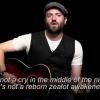5: Video performance, "Hallelujah" in Yiddish by Daniel Kahn, 2016.
American musician and songwriter Daniel Kahn uploaded this video to YouTube in November 2016, right around the time that Leonard Cohen passed away. In the video, Kahn—who lives in Berlin, where he's the frontman in a klezmer-punk-folk band—strums an acoustic guitar and sings his Yiddish adaptation of Cohen's "Hallelujah," while looking straight into the camera. English subtitles make apparent the gaps and overlaps between Kahn's Yiddish version and Cohen's original English.
Why translate an English song from the 1980s into Yiddish? Kahn says, "‘Hallelujah’ is essentially a Yiddish song Leonard Cohen wrote in English, by which I mean it’s Jewish. It’s like the Song of Solomon, the double working of devotion to God and devotion to a lover, the juxtaposition of eroticism and spirituality. These are all, to my opinion, very Jewish themes. To do it in Yiddish made sense.”
Suggested Activity: Listen to Kahn’s Yiddish adaptation of “Hallelujah” with your class and discuss: Is there anything that surprised you about this version of the song? What does Yiddish do for the song? And what does the song do for Yiddish? What changes did Kahn make to the tone and structure of the song? Compare his lyrics to the original lyrics – do you think his adaptation stayed true to the meaning of the original lyrics or did it distort the original? Defend your answer with examples from the lyrics. What audience do you think Kahn had in mind when he adapted, performed, and posted this song?
Source: Kahn, Daniel. “Leonard Cohen's "Hallelujah" - in Yiddish.” YouTube video, 4:42. Posted November 2016. https://www.youtube.com/watch?v=XH1fERC_504.

